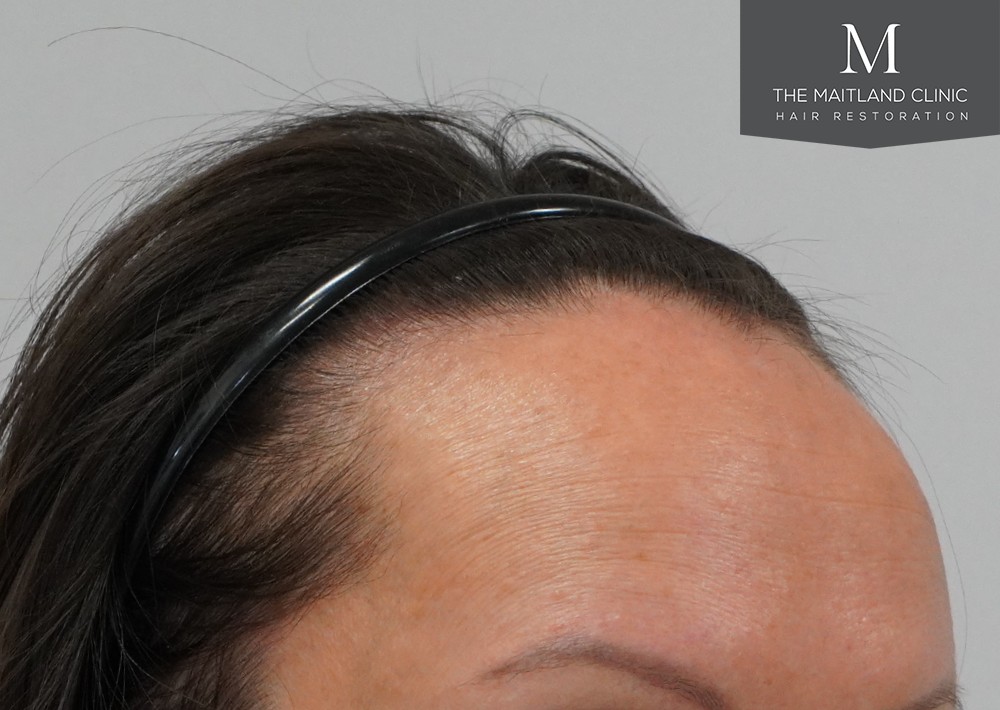Alopecia Treatment: A Comprehensive Guide
5th June 2024

Hair loss, medically known as ‘alopecia’, is a condition that impacts millions of people in the UK each year. Whether it’s temporary issues or a chronic condition, hair loss can dramatically affect your overall quality of life.
At The Maitland Clinic, we offer a wide range of evidence-based alopecia treatments. Our team of highly skilled hair restoration experts are dedicated to understanding your unique situation to help find you the most effective and sustainable hair loss solutions.
Understanding alopecia
Broadly speaking, alopecia means hair loss. There are many different types of alopecia, each with varying causes and treatment options.
The most common form of alopecia is male and female pattern hair loss, also known as androgenetic alopecia, affecting around 50% of people to some degree. It’s a genetic condition that results in hair loss in certain parts of the scalp. Another common form of hair loss is alopecia areata, which is an autoimmune disorder that causes patchy hair loss. As well as genetics and autoimmune disorders, hair loss or shedding can also be caused by:
- Hormonal changes: such as during pregnancy, menopause, or thyroid issues.
- Poor hair care: such as tight hairstyles (causing traction alopecia), or excessive heat or chemical treatments (like perms or dyes).
- Stress or trauma: as this can disrupt the hair growth cycle.
- Lifestyle and diet: such as insufficient nutrients or smoking.
- Medical conditions or treatments: such as chronic illnesses and scalp infections. Medications for illnesses such as cancer, arthritis, and heart problems can sometimes cause hair loss too.
Choosing an alopecia treatment
Establishing the likely cause and type of alopecia is really important as it can help to identify the most effective treatment options. At The Maitland Clinic, our extensive consultation process helps accurately diagnose each individual.
Our consultation involves:
- An in-depth scalp analysis using the latest technology.
- A discussion around your health, wellbeing, and lifestyle, ensuring we can identify treatment options that fit with your everyday life.
- Identifying your hair goals and expectations.
- Discussing various treatment options.
Once we’ve established a diagnosis and explored treatment options, we encourage you to take time to consider your choices. We don’t rush anyone to make a decision and are happy to answer any questions so that you can make a fully informed decision about your care.
Alopecia treatments
There are a variety of options when it comes to alopecia treatments:
| Treatment type | How does it work? | Who is it suitable for? |
| Hair loss medication | There are several types of medication which work differently to target alopecia, including:
Hair loss medication has shown to be extremely effective in slowing down hair loss and promoting hair growth. You can read more about hair loss medication here. |
People in the earlier stages of hair loss who have thinning hair, but aren’t a candidate for a hair transplant.
Patients who have had hair transplant surgery and want to help retain as much native hair as possible. Some medications are not suitable for premenopausal women. |
| Laser therapy | Theradome is a helmet-shaped device that emits low-level laser wavelengths throughout the scalp. This energy stimulates cellular reactions within the scalp that lead to cell regeneration and increased blood flow to the hair follicles. This can result in increased hair growth.
It’s a non-invasive procedure that can conveniently be carried out at home. It can also be combined with other hair loss treatments for maximum effectiveness. |
People in the earlier stages of hair loss who have thinning hair, but aren’t a candidate for a hair transplant.
Patients who have had hair transplant surgery and want to help retain as much native hair as possible. People who can’t or do not want to take medication. |
| Platelet-rich Plasma (PRP) treatment | PRP therapy is a non-surgical procedure that uses the body’s own healing capabilities to encourage healthier hair growth. A small sample of blood is taken from the patient and is treated to concentrate the platelets, a type of blood cell which produces growth factors. This plasma is then re-introduced into the scalp, where the growth factors help to promote healthy hair and scalp. This process can stimulate improved hair growth and reduced hair loss. | People in the earlier stages of hair loss who have thinning hair, but aren’t a candidate for a hair transplant.
People who can’t or do not want to take medication. Those with thinning hair, rather than people who have bald patches. |
| Follicular Unit Transplantation technique (FUT) | FUT, also referred to as ‘strip’ surgery, is a type of hair transplant. It involves removing a strip of skin from a donor area of the scalp where hair is ‘permanent’, meaning it grows for life. Hair grafts are then dissected from this strip and inserted into the recipient area. There is a linear scar where the strip has been stitched up, but this can be hidden with slightly longer hair. | People with more extensive hair loss who do not intend to shave their heads (and will tolerate a linear donor scar).
Your age, health, available donor hair, and considerations of future hair loss may impact whether FUT is suitable for you. |
| Follicular Unit Extraction technique (FUE) | FUE is another hair transplant technique. However, instead of removing a strip of skin from a donor area, individual hair follicles are extracted directly from the donor area and placed into the recipient area. This technique produces tiny dot scars which aren’t usually noticeable. | People with hair loss who prefer the option of short hair at the back and sides of their head.
Your age, health, available donor hair, and considerations of future hair loss may impact whether FUE is suitable for you. |
Frequently asked questions around alopecia treatments
When should I seek professional help for alopecia?
The sooner you can seek help for hair loss, the more effective treatments are likely to be. If you’re experiencing persistent or rapid hair loss, or any kind of scalp issue, we would recommend seeking support from our team as soon as possible.
How effective are alopecia treatments?
At The Maitland Clinic, we are passionate about ensuring all our treatments are grounded in the latest research. All our recommended treatments are evidence-based and have shown to be effective in promoting hair growth or reducing hair loss. Results will vary between individuals, and an in-depth consultation helps us to identify the most effective treatment for your hair type. During a consultation, we’ll talk you through the efficacy of each treatment option and the potential side effects.
See before and after results from previous clients.
Alopecia treatments at The Maitland Clinic
If you are experiencing hair loss, seeking professional advice is crucial to determine the best course of action for your specific situation. At The Maitland Clinic, we are dedicated to understanding the underlying cause of your hair loss and can help to implement strategies for you to effectively manage alopecia and restore your confidence.
Get expert advice and alopecia treatment from our team by completing our enquiry form or calling us on 02392 706122.










